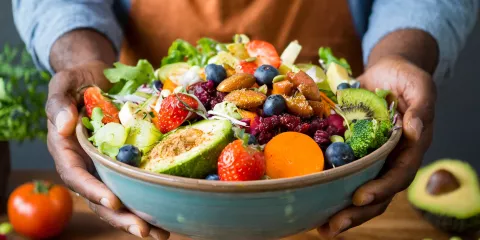
As a relatively new field of study, nutritional science continues to evolve every day. When new studies and scientific evidence emerge, food and nutrition recommendations shift to meet our modern lives and keep us healthy. Combine this with an overwhelming amount of misinformation on social media and TV, celebrity trends, and the rise of fad diets, it’s no wonder that so many Americans are confused when it comes to how to properly nourish their bodies. We’re debunking some of the top food myths circling around today to help you make healthier choices and bring you up to modern nutrition times.
READ MORE: 6 Easy Food Swaps To Be More Heart Healthy
6 Surprising Food Myths
Myth #1: Fat Makes You Fat
Hailing from the 80s and 90s, this problematic myth has led many Americans to fear the consumption of all fats. Today, most nutritionists now recommend limiting intake of foods that are high in saturated and trans fats, including fatty meats, certain packaged foods, and high-fat dairy products, to under 10% of daily calories per day,1,2 due to their effect of driving up overall cholesterol and LDL cholesterol levels. “Low fat” or “fat-free” packaged goods (products that coincidentally rose in popularity in the 80s and 90s) tend to have a higher sugar content than regular foods, and eating a high-sugar diet can contribute to weight gain, blood sugar issues, and other chronic conditions.3,4
Alternatively, and to many Americans' surprise, eating enough unsaturated, monounsaturated, and polyunsaturated fats is vital to maintaining a healthy diet. That’s right - healthy fats are good for the body! Not only is fat a major source of energy, it also helps your body absorb some vitamins and minerals, helps build cell membranes, and makes up the exterior of your cells and nerves.2 Since fat (including saturated fats) should account for about 20%-35% of your daily calories, try to substitute processed fatty foods for some healthier alternatives, like avocados, eggs, fatty fish, nuts, olive oil, or dark chocolate.5
Myth #2: Eating Carbs Will Make You Gain Weight
When it comes to gaining weight, carbohydrates are often seen as public enemy number one. However, with carbohydrates being your body’s main source of energy, eating the right amount of carbs helps power your brain, kidneys, muscles, and heart. 6 To reap these benefits, the Dietary Guidelines for Americans suggest that 45%-60% of your daily calories come from carbohydrates.
This common food myth has placed the focus on all carbohydrates, rather than focusing on the real culprit - refined carbs. Products like white bread, cakes, cookies, and fruit juice have been processed to remove most of the nutritional and fiber value that carbohydrates offer. 7 On the other hand, it’s recommended to incorporate whole grains such as brown rice, oats, and whole-wheat bread and pasta or carbohydrate-rich fruits like grapes, bananas, pears, and apples into your diet.8 Be mindful of portion sizes and try to limit these healthy carbohydrates in meals to about 1 cup, or about a quarter of your plate. By choosing nutrient-rich sources of carbohydrates and keeping track of portion sizes, carbohydrates can be part of a healthy diet, even when trying to lose weight.7
Myth #3: The More Protein, The Better
High protein diets are often used to lose weight or build muscle. The exact amount of protein one should eat depends on your activity level, muscle mass, and current health, and can range anywhere from 10%-30% of your daily caloric intake. 9,10 However, eating anything in excess, including protein, can have some negative effects.
For example, consuming too much red meat has been linked to a variety of chronic health issues, including cancer, so be sure to incorporate lean animal proteins like chicken or turkey.11 Additionally, high-protein diets tend to be low in fiber, which can contribute to constipation.12 On the other hand, replacing carbohydrates with protein isn’t a guaranteed method of losing weight - a 2016 study showed that replacing carbs with proteins was associated with a greater risk of weight gain.
Myth #4: Vegans don’t get enough protein
“But, where do you get your protein from?” Any vegetarian or vegan has probably been asked this question countless times. This common food myth is busted by nutritious plant-based diets, proving there is much more protein to choose from than meat. That said, another myth to be busted is that plant-based proteins are “incomplete protein sources”. However, you can still get sufficient amounts of all the essential amino acids your body needs if you eat a variety of plant-based proteins.14
Those looking to reduce their animal protein intake should look to incorporate a variety of whole-food plant-based proteins like legumes, nuts, seeds, quinoa, and lentils while keeping soy-based and processed proteins like tofu and seitan in moderation. Plus, beans and legumes are nutrient-dense, packed in fiber, B vitamins, iron, potassium, and other minerals, and are low in fat and full of protein.15
Myth #5: Juicing and Detoxes Are Good Ways to Lose Weight
Often endorsed by celebrities and influencers, the trend of juice cleanses and detoxes as a way to lose weight poses a handful of threats. Often, these liquid-based fad diets show short-term results without many long-term benefits, like losing water weight at the expense of not having enough energy from a low protein and low-calorie diet to build muscle while exercising.16 Juices also lack fiber, which offers many health benefits, like helping with blood sugar management, protecting your heart, and reducing the risk of colorectal cancer.
There is a lack of scientific evidence to support the effectiveness of juice cleanses. In fact, the body cleanses and detoxifies itself naturally, leading many to question if juice cleanses are just marketing tactics for selling expensive and healthy-looking bottled juices. Finally, not everyone should try juice cleanses because they can lead to eating disorders or to an unhealthy relationship with food.17
Myth #6: Gluten-Free Is Healthier
With the rise of many consumers “going Gluten-Free”, you may have wondered if you need to remove gluten from your diet. Unless you have a Celiac Disease or an intolerance to gluten (which is found in wheat, rye, barley), avoiding gluten consumption can actually be a less nutritious option with a higher price tag than regular foods containing gluten. While gluten-based products like whole wheat bread are fortified with folic acid, iron, and other nutrients, gluten-free products tend to have less fiber and more sugar and fat.18
If eating gluten-based foods tends to bring you digestive symptoms, try removing it from your diet to see if not eating it helps you avoid these feelings, like gas, abdominal pain, bloating, and even diarrhea. If it works, you may want to talk to your physician about Celiac Disease or gluten sensitivity. However, when eaten in moderation as part of a balanced diet, most Americans don’t need to worry about cutting gluten out of the picture.
The Bottom Line on Food Myths
A healthy, balanced diet is key. With the rise of fad diets, celebrity-endorsed trends, and an abundance of information on the internet, it’s best to talk to your doctor or dietitian if you’re unsure about your ratio of fats, proteins, and carbohydrates. As experts, they’ll be able to review your medical history and give you personalized dietary advice to meet your health goals.
READ MORE: Healthy Diet & Supplement Guide.
References
2https://www.health.harvard.edu/staying-healthy/the-truth-about-fats-bad-and-good
5https://www.healthline.com/nutrition/10-super-healthy-high-fat-foods
6https://www.reidhealth.org/blog/carbohydrates-101-the-benefits-of-carbohydrates
7https://www.health.harvard.edu/diet-and-weight-loss/carbohydrates--good-or-bad-for-you
8https://www.healthline.com/nutrition/fruit-and-low-carb#TOC_TITLE_HDR_2
9https://www.healthline.com/nutrition/how-much-protein-per-day#weight-loss
10https://www.health.harvard.edu/nutrition/when-it-comes-to-protein-how-much-is-too-much
11https://jamanetwork.com/journals/jamainternalmedicine/fullarticle/1134845
12https://www.healthline.com/health/too-much-protein#risks
13https://www.clinicalnutritionjournal.com/article/S0261-5614(15)00091-6/fulltext
14https://www.healthline.com/nutrition/protein-for-vegans-vegetarians#plant-vs-animal-protein
16https://www.livescience.com/48767-juice-cleanse-myths.html]
17https://www.healthline.com/nutrition/juice-cleanse#bottom-line












